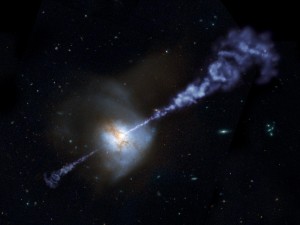Posts Tagged ‘Herschel Space Observatory’
Do Black Holes Inhibit Star Formation?
It’s actually more of an open question than I would have thought. At face value, you would expect that the presence of a powerful black hole would disrupt the normal star formation processes, and the evidence is certainly leaning that way. However, there’s still enough uncertainty on the issue to keep some astronomers with the Herschel Space Observatory mission busy (and, I suppose, paid).
The results from Herschel show that in galaxies 8 to 12 billion light years away (and therefore 8 to 12 billion years ago), star formation slowed dramatically, and the deceleration was greater in galaxies with large central black holes. As would seem logical, the black holes ripped up the coalescing gas, keeping it from gathering into the necessary density. You can read more about it here.
The most striking fact presented by the article is the degree to which star formation has declined since that time. Eight to twelve billion years ago, stars were forming at ten times the rate that they are now, and galaxies were a thousand times brighter than they are now! It’s difficult to really grasp the magnitude of the fact. I mean, we all hear that the universe has cooled over its life, and will continue to get colder, but . . . we don’t often talk about how much darker it’s getting, do we?
I’m sure some astronomer will point out that, if you look at infrared wavelengths, it’s actually quite bright, but the point is that the infrared light was produced long ago. Our light bulbs are going out and a lot of the light is only there because it took this long to get to us. And the damned black holes have been making the matters worse!
Ahem. Anyway, it does make you wonder whether the fundamental constants of the universe were as perfectly tuned as they could have been, doesn’t it?
